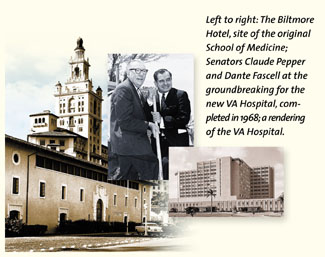School of Medicine and Miami VA Derive Strength from Enduring Partnership
![]() hough
we hadn't built it--still they came. Nearly 50 years ago, when
the University scored a coup establishing Florida's first medical
school, there remained--after a short celebration--the question
of where to house the first class of medical students. Interestingly,
it was in a place that is today well-known for housing visitors
from around the world in five-star comfort--the Biltmore Hotel.
hough
we hadn't built it--still they came. Nearly 50 years ago, when
the University scored a coup establishing Florida's first medical
school, there remained--after a short celebration--the question
of where to house the first class of medical students. Interestingly,
it was in a place that is today well-known for housing visitors
from around the world in five-star comfort--the Biltmore Hotel.
But back in 1952, the hotel housed the Coral Gables Veterans Administration Hospital, established shortly after the end of World War II. Twenty-eight medical students (25 men; three women), a dean, and four faculty members spent their first couple of years in a building that had been the servants' quarters of the once luxurious hotel. Known as the Anastasia Building, it functioned as the medical school's research facilities. In return for laboratory space, the faculty served as the attending physicians at the VA hospital.
 Since
those early days, the School of Medicine has grown into one of
the nation's leading sites for research, education, and care,
aided, in part, by its affiliation with the Miami VA. Situated
on more than 12 acres of a 67-acre medical complex, the school
no longer relies on the VA Hospital to house its students. But
the VA continues to be a significant training ground for the
University's medical students, as well as for more than half
of the 1,200 physicians in Jackson Memorial Hospital's residency
program.
Since
those early days, the School of Medicine has grown into one of
the nation's leading sites for research, education, and care,
aided, in part, by its affiliation with the Miami VA. Situated
on more than 12 acres of a 67-acre medical complex, the school
no longer relies on the VA Hospital to house its students. But
the VA continues to be a significant training ground for the
University's medical students, as well as for more than half
of the 1,200 physicians in Jackson Memorial Hospital's residency
program.
While the VA relocated to its present location adjacent to the UM/Jackson Memorial Medical Center in 1968, the spirit of that early partnership endures to this day. The medical school continues to reap the benefits of a significant clinical presence and conducts a number of research initiatives from the VA. Indeed, most of the School of Medicine's clinical departments offer services at the VA, and a number of the basic science departments have faculty with joint appointments at the VA.
The collaboration has been advantageous for both entities. "The relationship between the two institutions has allowed for the joint recruitment of absolutely superb clinician-scientists, who not only conduct high-quality research, but also are responsible for the excellent clinical care provided at the VA hospital," says John G. Clarkson, M.D., senior vice president for medical affairs and dean of the School of Medicine.
Many factors have contributed to this successful affiliation. It helps that the institutions are somewhat interdependent--it is nearly impossible for a medical student to graduate without a rotation at the VA and almost all of the VA hospital physicians are UM faculty. Many believe, however, that the partnership's success is primarily due to the spirit of cooperation between UM and the VA at the highest levels. The VA's chief of staff is also the School of Medicine's associate dean for veteran affairs. In fact, the person holding that office now, Michael Mintzer, M.D., meets quarterly with the School of Medicine's dean and department chairs to discuss the joint interests at the VA.
Dr. Mintzer notes that not all affiliated veterans hospitals enjoy such a close and productive relationship with their academic partners. In fact, he says, some affiliations are downright adversarial. "This is not a vendor-buyer relationship. It's a partnership."
--Ruth-Ann Kimbrough